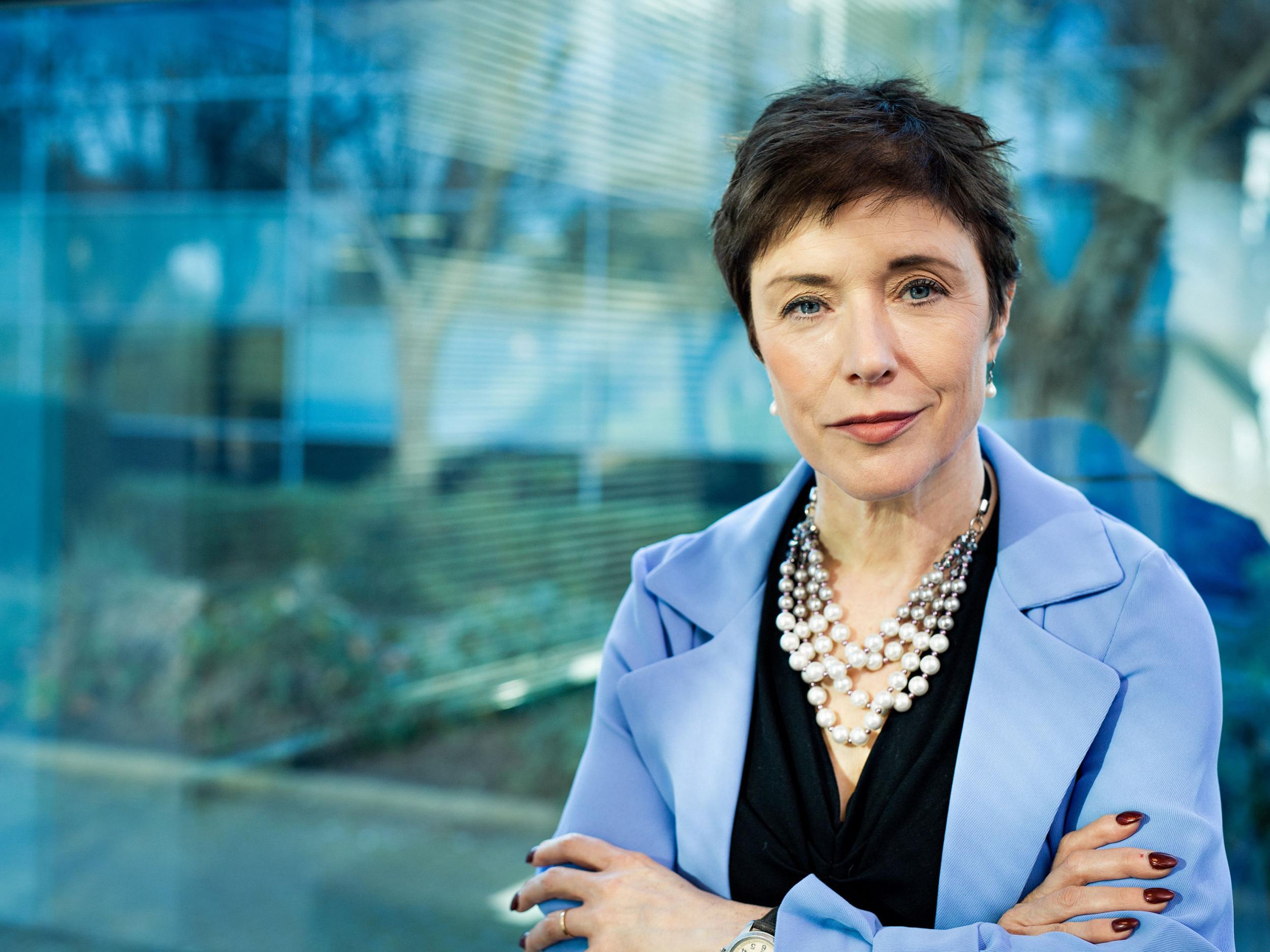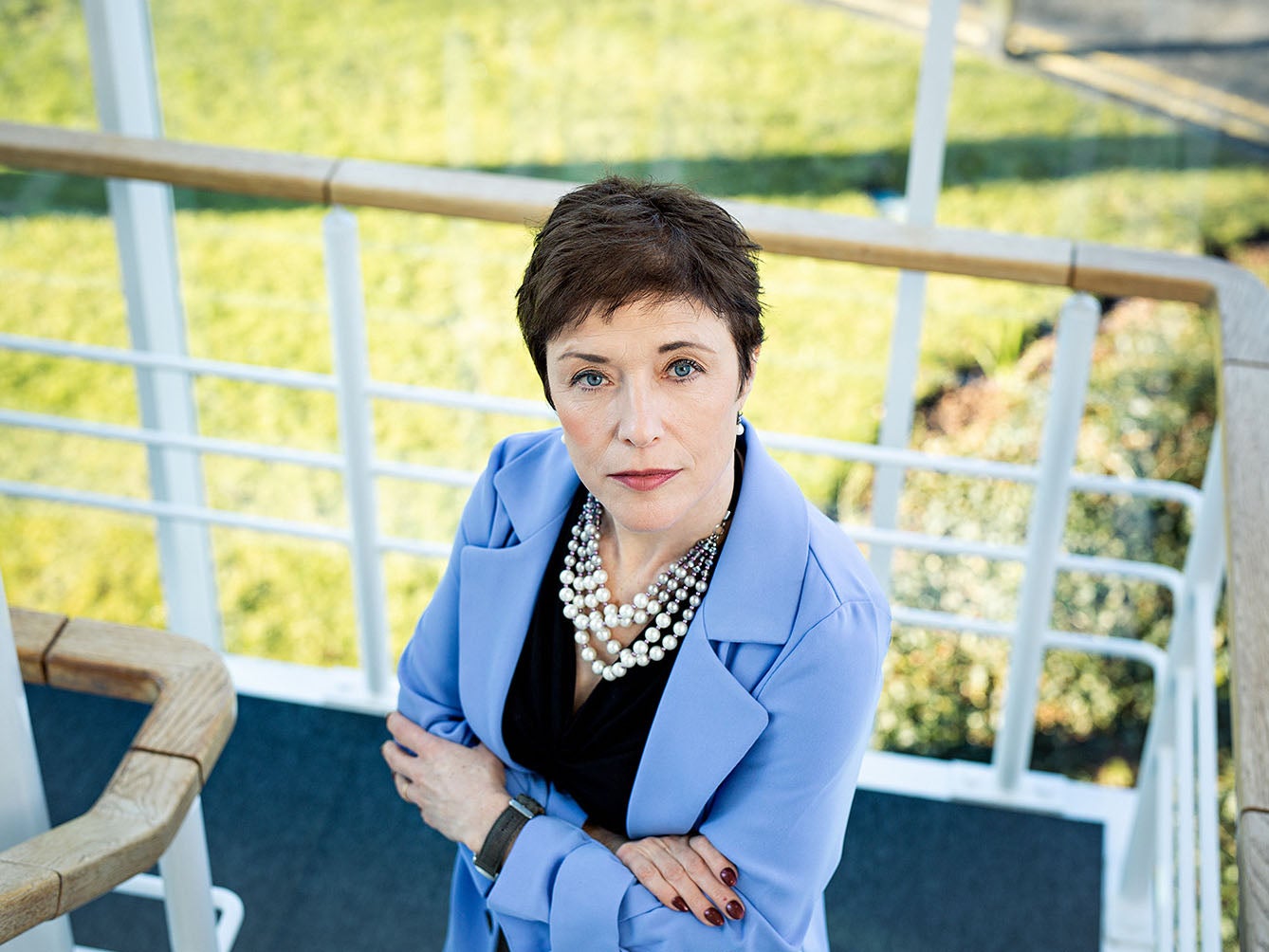‘Taking just one image down is a victory’: The woman on a mission to rid the internet of child sex abuse
Internet Watch Foundation CEO Susie Hargreaves tells Zlata Rodionova about how the skills she learnt in the arts landed her a job at No 10 working on the Jimmy Savile revelations


The crime of online child sexual exploitation is one that most people find difficult to even talk about – but for Susie Hargreaves OBE, it’s part of her daily job.
As the chief executive of the not-for-profit Internet Watch Foundation (IWF), she works with police and governments around the world as well as industry leaders to make the internet safer by removing images of child sexual abuse.
What few of us appreciate is the sheer size and scale of the problem. According to the police, there are 100,000 people sitting in the UK right now demanding images of the abuse of children.
But where others would see an insurmountable task, Hargreaves saw an opportunity to make a difference. “In my view, if you take one image down, that’s a victory, because it stops one child being victimised – and we take down thousands of images a day. If you talk to some of the survivors, it is essential for them to know there are organisations like us around them,” Hargreaves tells The Independent.
In 2018, the IWF removed more than 105,000 web pages containing child sexual abuse images (one page can have one or thousands of harmful images and videos). This compares to 9,000 pages in 2011, the year Hargreaves joined as a CEO.
“When the organisation launched in 1996, there was no Google, Facebook or Twitter and even in the eight years I’ve been there, we’ve seen the landscape change massively,” she says. “This makes it both exciting and hugely challenging. That sort of shifting ground all the time means you have to stay on top of your game.”
Hargreaves joined the IWF after an eclectic career mostly spent working in the arts and charity sectors. “It’s not that I had a plan and pursued it,” she says. “There’s been a number of opportunities that came up that I’ve taken. But there’s been an overarching theme with everything I’ve done, which has been work associated with young people.”
Born in York, Hargreaves was one of nine children and the sixth eldest, often cooking for and looking after her younger siblings.
“Most of my siblings and I were kind of earmarked for different things – the ‘academical one’, the ‘creative one’... and I was the ‘practical one’. There was very little pressure on me because I wasn’t identified as the big academic or creative genius, I kind of got on with stuff, which in retrospect has been quite an advantage,” Hargreaves says.
People think their children are safe at home, so we need to get the message out there without scaring people. It’s all about ensuring that these children get proper education and they’re able to build their own resilience and look after themselves online
Inspired by her passion for cooking, she attended Leeds Polytechnic (now Leeds Beckett) and completed a higher national diploma in hotel catering and institutional management, which led her to become assistant catering manager of Harrogate Hospital at just 21.
“You might think it was a useless thing to do but it was a very challenging job,” she recalls. “I had 35 staff, we had 400 patients and a very tight budget. I learnt huge amounts when it comes to managing a team and staff relations.”
She eventually resigned to work as an administrator in a number of theatre companies including the Watermans Arts Centre in London, ending up as deputy chief executive there. “I went to work in the arts sector because I wanted to do something creative, and I knew that I had the organisational skills for it,” she says. “Gradually, I just moved through different companies and I developed these skills further. I felt that the arts could empower young people and give them the right tools to find their voice.”
One of her standout jobs included being general manager at the socialist theatre company Red Ladder, where she stayed for six years. “It was a feminist company and we did a huge amount of work in terms of empowering young women.”
She also worked at Pilot Theatre where she met her husband Marcus Romer, now artistic director of the company, and one of the first people who influenced her to work in tech. “My partner has always been very tech-savvy,” she says. “He was very much at the forefront of using technology in his shows, meaning technology always played a prominent role in our lives.”

In 2006, when she was at a crossroads in her career, Hargreaves applied for and received the Clore Fellowship, which is given to 25 leaders in creative sectors each year and includes a major grant of £20,000 to spend on personal development.
“It really changed my life,” she says. “In my career, I’ve been lucky to have the support of a few brilliant people. My mentor as part of the fellowship was Sir Ken Robinson, who is a world leader in terms of education – his TED talk is one of the most popular there is. He really helped me build my confidence.”
This belief in her skills and confidence is perhaps what encouraged her to call the IWF herself, despite not having any specific experience in the IT industry. “I read the job description and thought I had all the skills required. I was fortunate that these were recognised as transferable, I am not sure I would be so lucky today,” Hargreaves says.
In 2011, the issue of child sexual abuse was not on the front pages – but just a month after she joined, the Jimmy Savile revelations came out and it became a national concern. “I had no experience in public affairs, but suddenly David Cameron got personally involved and we were working in No 10,” she says.
“It was such a privilege to feel that the issue was taken seriously at the highest possible level, I relished the challenge. I was given this great opportunity to get our message across.”
In my view, if you take one image down, that’s a victory, because it stops one child being victimised – and we take down thousands of images a day. If you talk to some of the survivors, it is essential for them to know there are organisations like us around them
According to Hargreaves, a good leader needs to surround themselves with the best people, and she is truly proud of her team. “I am stunned by what our analysts do every year and I am exceptionally proud to represent this phenomenal group,” she says. Less than 0.1 per cent of the content IWF finds and blocks is from a UK address, down from 18 per cent when the IWF began operating in 1996.
“To be able to quantify that difference is just huge,” she says. “I am no longer speaking about making a difference in abstract terms.
“When working for the IWF, you can’t go home and talk about what you saw today, there’s never a good context for it. The only way you can talk about it is at work, with counsellors or with your colleagues. But we are trained to see what we see, and we know why we are seeing it.”
Hargreaves, a mother of two, now wants to put the issue of children’s vulnerability at the forefront of people’s minds without scaring parents.
According to the IWF’s latest report, so-called “self-generated” material now accounts for a third of indecent web pages being intercepted in the UK. Many youngsters film themselves in the comfort of their own bedroom thinking their videos are shared in the context of a consensual relationship, when in reality the person on the other end of the camera is often a predator who will then use this same content on a harmful website.
“Children are exceptionally vulnerable – these videos often feature kids in their bedroom at homes,” Hargreaves says. “In one video that I saw, a young 11-year-old child was engaging in very serious sexual activity and there was a shout ‘dinner’s ready’. People think their children are safe at home, so we need to get the message out there without scaring people.
“It’s all about ensuring that these children get proper education and they’re able to build their own resilience and look after themselves online.
“We also need to have a discussion about how it is dealt with on a legislative level, we can’t put all the offenders in prison but we need some mechanism to deal with them. Where there is demand, there will always be supply. We need to tackle that demand.”
With only a few weeks left until Brexit, Hargreaves also stresses the importance of international collaboration when it comes to making the internet safer for children. “For us, Brexit is really a big issue,” she explains. “The IWF gets £400,000 from the EU as part of the Better Internet for Kids programme. Without that funding, we wouldn’t be able to run Safer Internet Day for awareness in schools, as well as the helpline.
“More importantly for us than the funding is the fact that so much of what we do is governed by EU legislation. If that is not resolved, we are in big trouble.
“And, of course, the internet has no borders. Just because the majority of these websites are hosted in the Netherlands, doesn’t mean people don’t look at them in the UK. We have to take an international approach and put the issue above our individual organisations.”
Perhaps, surprisingly considering the gravity of her job, Hargreaves says it’s quite easy for her to switch off as she keeps herself busy with cooking, Spanish lessons or spending time with her family. “Because the nature of our work is so sensitive, our office isn't strict, with lots of days off. I went to Spain on holiday last week and only answered 12 emails,” she says.
Her proudest achievement? “I’m very proud that I managed to carve a career form inauspicious beginnings, that I have two relatively balanced, nice kids and that I am still with my partner after 32 years.”
Join our commenting forum
Join thought-provoking conversations, follow other Independent readers and see their replies
Comments